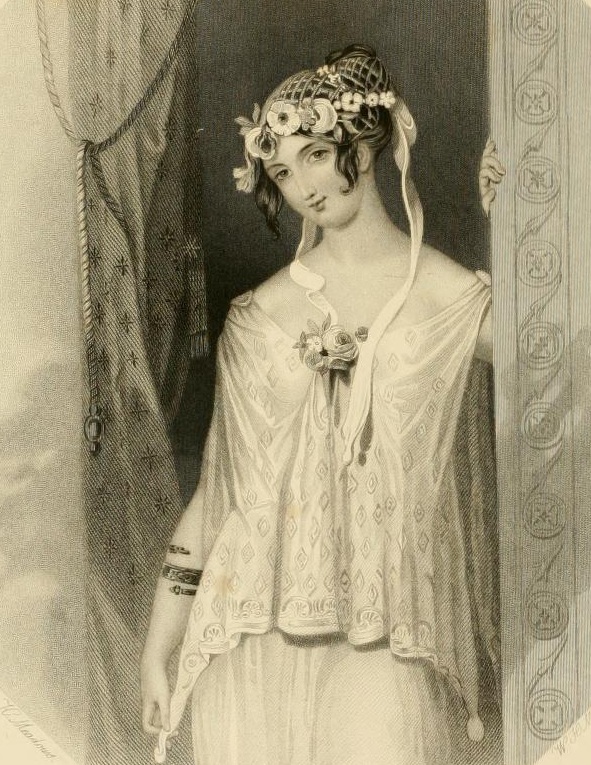| directory |
| home | contact |
|
|||||||||||||||
| search | |||||||||||||||
The Shakespeare Sisterhood: CressidaThis fair but frail beauty was the daughter of Calchas, a Trojan priest, who, in the great war between his countrymen and the Greeks provoked by the abduction of Helen, Menelaus' queen, by Paris, one of the king of Troy's sons took part with the Greeks, and fled to their camp outside the walls of the "many-gated city," leaving Cressida with her uncle Pandarus.Prince Troilus, Priam's youngest son, became blindly infatuated with the beautiful Cressida, who secretly returned his passion, but with coquettish dissimulation held herself aloof, despite the well-laid plans of her intriguing uncle to consummate the tender hopes of Troilus. At last, however, beset on every side, Cressida yielded to the importunate suit of her lover, and confessed herself won; but the very next day, the Greeks, moved by the prayers of Calchas, sent a herald to the Trojans, to proffer Antenor, one of the Trojan commanders whom they had taken prisoner, in exchange for Cressida, the priest's daughter; and the offer was joyfully accepted. Cressida, accordingly, departed for the camp, escorted by Diomedes, a Grecian general, on whom, notwithstanding her vows of fidelity to Troilus - himself the most constant of lovers - she at once bestowed her perfidious favors; the Greek, for all his valor, was not proof against her charms. Shortly afterward, during a truce, and a friendly interview of Hector and Troilus with the Greek heroes, on the latter's own ground, Troilus was made aware of Cressida's perfidy, and from a concealed position witnessed certain love passages between her and Diomedes, in which she presented her new lover with the very same gage d'amour that she had accepted from him when she left Troy. On the morrow, during the engagements by single combat between the most puissant of the Greeks and Trojans, Troilus fought valiantly with his rival, Diomedes, who tauntingly displayed Cressida's gift on his helmet; but the rash, unpractised stripling could not cope with the tried skill of the Greek; Diomedes succeeded in dismounting the "amorous Trojan," and sent his charger as a trophy to the lady Cressida. On that same day the valiant Hector who had gone forth to battle despite the tears and prayers of his wife Andromache, despite the entreaties of his royal father, and the foreboding utterances of the forlorn Cassandra, whose ravings might well have been accepted as inspirations was treacherously murdered by Achilles, the champion of the Greeks. In puny contrast with Egypt's queen of voluptuousness - the same in kind, but immeasurably below her in degree - stands Cressida, the type of coquettes of little ambitions and less brains, flirting, jilting, silly wantons, whose insignificant amours lack every quality of sentiment or taste which might appeal to one's toleration - most of all, that intellectual element which may impart even to her sin a certain dignity. Cressida is but another name for an inconstancy tenfold more hopeless than downright treachery, in that it implies an inherent incapability of being true; the involuntary breaking of her solemn oaths to her lover, uttered in all sincerity perhaps, betrays a nature far more hopelessly depraved than if she had, from the first, meant to deceive him. Selfish love of admiration possesses her completely; her life is devoted to the gratification of a petty vanity, and the study of a very low order of seductions to procure it; not once do her faults rise to the dignity of bad passions, nor are they ever honored with more indignation than a contemptuous disgust. Her penchant for the handsome young Troilus is utterly without taste, "tenderness, passion, or poetry;" it is only the diluted romance of a giddy-pated girl. Her confession of love for him, in which she judges him by her own fickleness and wanton exercise of power, is characteristic: Cres. Boldness comes to me now, and brings me heart: -And even more Cressid-like is her explanation of the mean philosophy that prompted that seeming "stubborn-chastity against all suit," which so captivated her hero-lover: But more in Troilus thousand fold I seeIn the parting scene she makes much of her pretty poutings and her spoilt-child petulance; the threatened destruction of her beauty is an exquisite touch of nature, while her high-sounding oaths are ludicrous only to those who have anticipated the sequel: Cres. O you immortal gods! I will not go.We cannot more appropriately conclude our remarks, on a subject that certainly tempts us but little, than by quoting the trenchant description of the sage Ulysses: Fye, fye upon her! How to cite this article:______ Related Articles
|

|
©1999-2021 Shakespeare Online. All Rights Reserved.